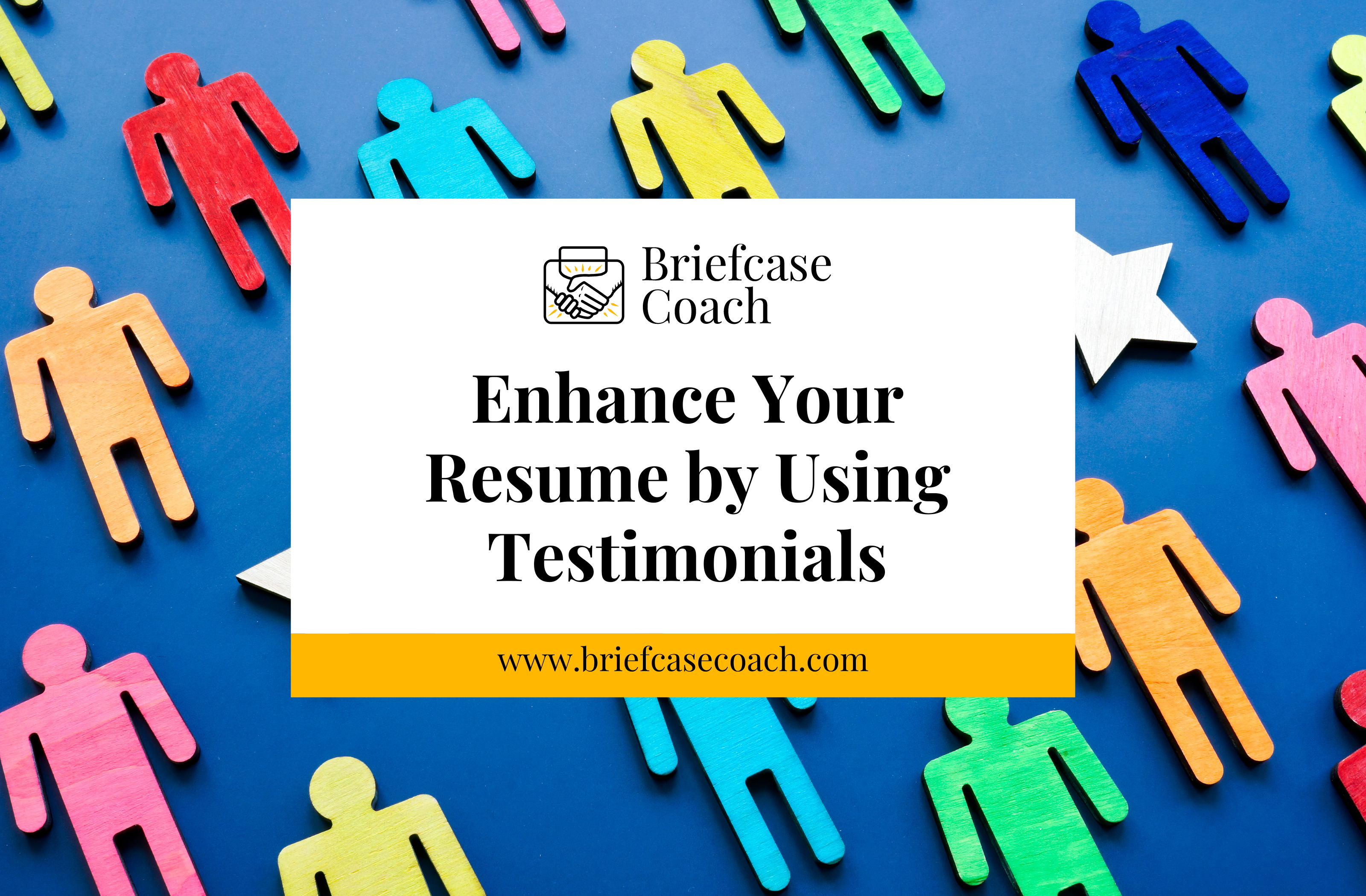- Briefcase Coach's Career Briefs: Job Search Newsletter
- Posts
- Briefcase Coach's Career Briefs: Job Search Smarter
Briefcase Coach's Career Briefs: Job Search Smarter
In this issue: visionary leadership, promoting yourself, new LinkedIn feature for job seekers, navigating a toxic work environment and more...

Dear Reader:
We all have difficult days at the office. On these days, there can be a lot of stress and pressure to get the job done. This can lead to feelings of discouragement and frustration. It's important to remember that difficult days are part of the job and to take the time to reset and refocus.
How do you determine if it's just a rough patch at work or a sinking ship?
This is a question I've been pondering. I once heard that if you like 70% of your job, 70% of the time, you have a great thing. That's unscientific advice, but it's stuck with me. It's unrealistic to expect to love your job every day.
I posed this question to my LinkedIn followers and got some thoughtful responses. Diana Alt, a fellow career coach, shared that she had a friend who implemented a time-based rule. He wouldn't apply for jobs until after six months of being unhappy at his current job. His stance was that if problems persisted that long, it was a fundamental change, not a rough patch."
Adria, a management consultant, suggested, "when I persistently have more bad days than good in a week, it's likely time to seek a new organization." Linda, a healthcare leader, said, "when leaders aren't held to the same accountability as those they lead, the ship is in serious trouble."
Another career coach, Julie Wycoff, recommends asking yourself two questions: "Does the end goal feel worth fighting for? Am I up for the challenge?"
So what does it take to love your job? A combination of factors like job security, positive relationships with teammates, and feeling like your work is meaningful, all contribute to job happiness. Having a good work/life balance and feeling appreciated and supported can also play a role in how much you enjoy your job.
How does your job feel to you? Do you love it? When do you "know" it's time to look for other opportunities?
Rooting for you,

It’s possible to pivot in your job search without losing sight of your end goal.
American entrepreneur, Eric Ries tweeted “A pivot is a change in strategy without a change in vision. You cannot have a pivot without vision (that's just wandering around).” While he was probably referring to the building of a business, this is also very true for a job search.
I talk to hundreds of job seekers every month who are looking to change careers, companies or level up in their organization. My number one piece of advice: have a clear vision. Taking the time to develop a job search strategy can help narrow down focus and identify target positions. Once you have identified target job descriptions, it will make writing a targeted resume easier.
Do you feel lost in your job search? Feel like you are just wandering around, spinning your wheels? Maybe it is time to pivot your strategy. A pivot in strategy does not mean a change in your end goal. Maybe a pivot in strategy is means an update to your resume, a different networking plan, brush up on your interview skills or an update to your LinkedIn profile.
The importance of self promotion.
As you look to move up the ladder in your career, you will face greater competition and will have to advocate for yourself, the business, and the organization. Self-promotion is key. Job seekers need a strategy for enhancing your professional reputation, gaining visibility, and improving your career prospects. Until now, you may have relied on your own abilities and hard work alone to advance in your career. Now, you need a network.
Executive coach, Lisa Nirell in a recent post emphasizes self-promotion with her clients, but says the top reasons they push back are:
🎵 "I am too BUSY to focus on self-promotion!"
🎵 "I do good work and have advanced degrees...that's good enough!"
🎵 "I need someone else to promote me; self-promotion is sleazy."
🎵 "I need even MORE certifications before I self-promote!" (I hear that one from coaches all. the. darn. time.)

Are “bridge jobs” a good move for your career? For your resume?
I got an email from an unemployed job seeker a few weeks ago who asked me what I thought about him taking a part-time job at Home Depot as a sales associate while he looks for his next corporate “Director of Marketing” role.
“Would this be career suicide?”
Does it get you out of the house? Yes.
Does this help you contribute in a meaningful way? Yes.
Do you like tools? Yes.
Can you learn anything in this role? Yes.
Will you be able to maintain job search intensity? Yes.
✅ Sounds like a great bridge job.
Bridge jobs can be a great option because they can impact your mood, get you out of the house, and can give you an income boost so that you can take more time to find the RIGHT next job.
However, I would not lead with the bridge job on your resume or LinkedIn. Work with a resume writer to help you address gaps and develop a positioning strategy.
(𝗣𝗿𝗼 𝗧𝗶𝗽: Get an LLC for your marketing consulting firm, create a logo on Canva, make a company page on LinkedIn, and use this to cover your gap. You do not have to disclose revenue or client names when interviewing for future roles.)
Have you ever taken a bridge job? What did you learn doing it? Was it a smart move for you?
New feature on LinkedIn to help jobseekers attract target jobs.
LinkedIn recently announced the rollout of a new feature - Top Choice Jobs. Top Choice Jobs allows job seekers to let hirers know the role they are applying to is the top choice for them, and gives hirers deeper intent signals from applicants who are most passionate about the role.
LinkedIn Senior Director, Ora Levit, reported when members who marked a job as top choice compared to those who didn’t, there was a “43% increase in candidates hearing back from recruiters when marking a job as top choice.”

What does it take to be a visionary leader?
A great leader has a vision and relentlessly pursues that vision. “They want to be ahead of trends, not get caught flat-footed by the competition and set the pace for their industries.” Fast Company shares nine traits of successful visionary leaders that the founders of Motto observed over their years of building their company.
I help many leaders capture their leadership narrative in their resumes. Leadership is a qualitative and personal journey that is hard to capture on paper. Many times, leadership accolades come in the form of relaying quantitative results of your team or your company. A story of failure due to taking a risk can also be an impactful narrative of visionary leadership.
The power behind AI and how it parallel’s the power of McKinsey.
I found this recent article in The New Yorker a really thought-provoking take on the rise of AI. According to the author, McKinsey is a management consultancy that provides an escape from accountability by doing things for you. A.I. has become a way for companies to evade responsibility by saying that it's just doing what "the algorithm" says.
The author poses the question: as A.I. becomes more powerful and flexible, how do we prevent it from becoming another version of McKinsey? Do you feel there is a parallel between McKinsey and AI’s realm of power and influence? Is it a good thing?

How should you deal with a toxic work environment and determine when to move on?
A toxic work environment can be exhausting and demoralizing. It can cause you to go work each day with one foot out the door, not working to your full potential due to the environment surrounding you. Before you quit your job and move to another company, consider changing jobs inside your organization. This article from Inc. gives advice on what to do to navigate the toxic waters in an attempt to improve the situation before jumping ship to a new company.
When is the right time for major life decisions?
Did you graduate high school or college with a detailed timeline for your life? A set plan for when you would get married, scale the corporate ladder, have kids, retire…? Many of us have a secret, internal timeline we're always measuring ourselves against.
Unfortunately, real-life curve balls may disrupt our plans. A recent article from The Wall Street Journal looks at circumstances facing real people and how it has led them to shift their timelines and priorities accordingly.
Can you do me a favor?
I’m on a mission to help job seekers land amazing jobs. Would you consider doing one of the following:
Forward or use the referral link below to share this newsletter with your job-searching friends or post about it on social media. This small act really helps!
Reach out to us about featuring your executive job posting in our newsletter. We are looking for hiring managers, founders, and search firms to talk on video about their ideal candidates.
Consider sharing my company name with your HR leadership. We are a great “white-glove” boutique option for executive outplacement
Recommend me as a paid speaker for your company events on networking, job searching, or leveraging LinkedIn
Recommend my services to high performers wanting to work one-on-one with an executive resume writer / or experienced interview coach
In Case You Missed It...
Top content pieces from our past two newsletters:




Reply